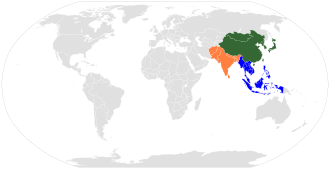
Back العالم الشرقي Arabic প্রাচ্য Bengali/Bangla Východní svět Czech Ανατολικός κόσμος Greek Idamaad Estonian Արևելյան աշխարհ Armenian Dunia Timur ID Austurlönd Icelandic Dunia Timur Malay ختیځه نړۍ Pashto/Pushto


The Eastern world, also known as the East or historically the Orient, is an umbrella term for various cultures or social structures, nations and philosophical systems, which vary depending on the context. It most often includes Asia, the Mediterranean region and the Arab world, specifically in historical (pre-modern) contexts, and in modern times in the context of Orientalism.[1] The Eastern world is often seen as a counterpart to the Western world.
The various regions included in the term are varied, hard to generalize, and do not have a single shared common heritage. Although the various parts of the Eastern world share many common threads, most notably being in the "Global South", they have never historically defined themselves collectively. The term originally had a literal geographic meaning, referring to the eastern part of the Old World, contrasting the cultures and civilizations of Asia with those of Europe (or the Western world). Traditionally, this includes Central Asia, East Asia, South Asia, Southeast Asia and West Asia.
Conceptually, the boundary between east and west is more cultural, rather than geographical, as a result of which Australia and New Zealand, which were founded as British settler colonies, are typically grouped with the Western world despite being geographically closer to the Eastern world, while the Central Asian nations of the former Soviet Union, even with significant Western influence, are grouped in the East.[2] Other than much of Asia and Africa, Europe has absorbed almost all of the societies of Oceania, North Asia, and the Americas into the Western world because of settler colonization.[3][4]
Countries such as the Philippines,[5][6] which are geographically located in the Eastern world, may be considered Westernized in some aspects of their society, culture and politics due to immigration and historical cultural influences from the United States and Europe.
- ^ Thompson, William; Joseph Hickey (2005). Society in Focus. Boston: Pearson plc. 0-205-41365-X.
- ^ Meštrovic, Stjepan (1994). Balkanization of the West: The Confluence of Postmodernism and Postcommunism. Routledge. p. 61. ISBN 0-203-34464-2.
- ^ "Embassy of Brazil – Ottawa". Brasembottawa.org. Archived from the original on 29 April 2011. Retrieved 6 May 2011.
- ^ Falcoff, Mark. "Chile Moves On". AEI. Archived from the original on 17 April 2009. Retrieved 6 May 2011.
- ^ Heydarian, Richard (12 January 2015). "Philippines' Shallow Capitalism: Westernization Without Prosperity". The Huffington Post. Retrieved 19 November 2016.
- ^ Hunt, Chester L. (1956). "The 'Americanization' Process in the Philippines". India Quarterly. 12 (2): 117–130. doi:10.1177/097492845601200204. JSTOR 45071116. S2CID 152671922. Retrieved 5 July 2022.
© MMXXIII Rich X Search. We shall prevail. All rights reserved. Rich X Search